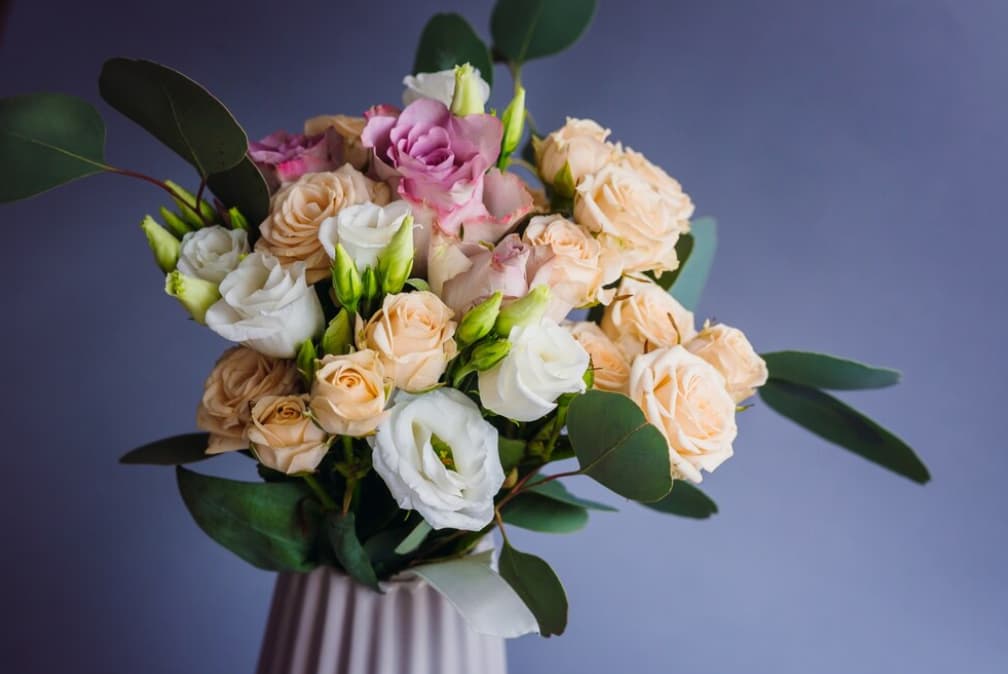Receiving a stunning bouquet calls for wanting to maintain its beauty for as long as possible. Here are some expert tips for extending the vitality of those blooms.
Upon receiving a bouquet from The Petal Emporium, it comes elegantly gift-wrapped and secured with twine for immediate display. One has the option to retain the string to preserve the bouquet’s intended design, or remove it to personally arrange the flowers. Exploring ways to make flowers last longer also complements the practical aspect of selecting the best-smelling blooms for your bouquet, creating a delightful and enduring floral experience.
Maximizing the Lifespan of Your Flowers
Ensuring the longevity of floral arrangements goes beyond simple care; it involves a series of steps that can significantly extend the vibrancy and life of your blooms.
- Vase and Water Preparation for Flower Arrangements: Ensuring the right environment for flowers begins with selecting an appropriate container. A vase that complements the bouquet’s size creates an appealing display, and its cleanliness is paramount. Any residual bacteria can shorten the lifespan of the flowers. Once the vase is spotless, fill it with fresh water, adding a flower food sachet if available;
- Leaf Removal from Stems: Proper preparation of the bouquet is crucial. Leaves submerged in water can decay rapidly, contaminating the water with bacteria and reducing the flowers’ longevity. Removing any leaves that will be underwater helps prevent this issue;
- Trimming the Stems: When flowers are removed from water, the cut ends begin to dry, impeding water absorption. Trimming a few centimeters off the stems with clean, sharp scissors before placing them in water is akin to ensuring they can ‘breathe’ and hydrate effectively;
- Angled Stem Cuts: Cutting stems at a flat angle can limit their water intake when they rest at the bottom of the vase. An angled cut, ideally at 45 degrees, increases the surface area for water uptake, ensuring the flowers can stay hydrated and vibrant;
- Flower Placement for Longevity: Flowers thrive in cooler environments, so it’s best to avoid placing them in areas with direct sunlight, high temperatures, or near heat sources like radiators. If the desired display area is prone to such conditions, temporarily relocating the flowers to a cooler spot can help, moving them back once conditions are favorable;
- Regular Water Maintenance: Maintaining the water level and replacing it every few days is crucial. With each water change, give the stems a fresh angled cut to prevent bacterial growth and facilitate better water absorption;
- Separation from Produce: Fruits and vegetables emit ethylene gas, which can prematurely age flowers. To extend their freshness, keep the bouquet separate from produce, ensuring the gases don’t accelerate their decline;
- Selective Stem Removal: As individual flowers may wilt at different rates, remove only the spent stems to keep the arrangement looking fresh. If petals fall into the water or a few days have passed, it’s time to change the water to prevent bacterial contamination.
Tips for Caring for Your Gifted Bouquet

Taking the time to care for your gifted bouquet is a small yet impactful investment that promises rich dividends in the form of vibrant and longer-lasting blooms. A bouquet that is neglected will wither and lose its charm far more quickly than one that receives thoughtful care. By adhering to the tips outlined above, you’ll be providing your flowers with the optimal conditions they need, ensuring that they not only endure but also thrive, bringing joy and beauty to your surroundings.
Conclusion
The joy a beautiful bouquet brings can last significantly longer with proper care. By following these steps, it’s possible to maintain the vitality, fragrance, and beauty of each bloom, prolonging your enjoyment of the bouquet. Whether it’s a gifted bouquet or a treat for yourself, giving flowers a little attention can go a long way.